| |
|
| |
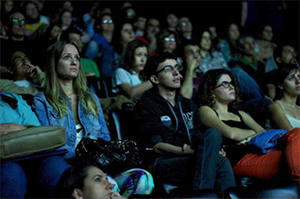 The 2013 Mostra Animal International Film Festival for the Animals attracted a full house to the Curitiba Cinémathèque
The 2013 Mostra Animal International Film Festival for the Animals attracted a full house to the Curitiba Cinémathèque
|
| |
|
| |
Brazilian Premiere
Peaceable Kingdom: The Journey Home wins an "Oscow"
Most filmmakers dream of winning an Oscar, but only three films each year are honored with an "Oscow." So you can imagine how thrilled we were to learn that the audience at Brazil's Mostra Animal International Film Festival for the Animals chose "Peaceable Kingdom: The Journey Home" to receive this special award when it premiered there in 2012.
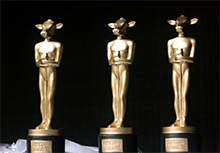
"We believe it was well chosen," said Louise Tezza, one of the the volunteers with the Brazilian Vegetarian Society which curates and hosts the event. "The tears and the testimonies of the public that followed the movie show that this is a powerful, inspiring film about how people can change, and that we can always choose the compassion path, no matter where we stand."
Louise was kind enough to send us many photos from the event. The one below, and the story behind it, was our favorite.
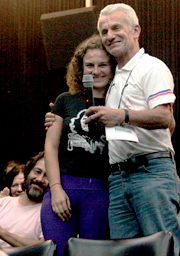
"After the display of 'Peaceable Kingdom' and after the Oscows were given," wrote Louise, "this man rose up and said that 'For two years, my daughter was trying to convince me to be a vegetarian. Now, in only a few hours, I'm no longer a carnivore.' It meant the world to us, and all the public cheered as well."
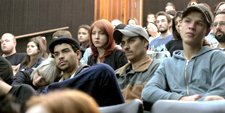
The organizers at Mostra Animal were so pleased with the audience response to "Peaceable Kingdom: The Journey Home" at their 2012 festival that they chose to show the film again in 2013, along with "The Witness," newly translated into Portuguese. Remarking on the final scene of "The Witness," Louise wrote: "Some people described it as the most touching and emotional moment in the Festival. In fact, do you remember that man that after 'Peaceable Kingdom' screening last year said he was no longer a carnivore? He was back this year, very enthusiastic about it, going vegan now and he was the one who said that about the most touching moment. And people around agreed." His daughter must be very proud of him now!
|
|
| |
|
Tribe of Heart films empower Brazilian artists and activists
Animal justice issues resonate with a culture forging a new social vision
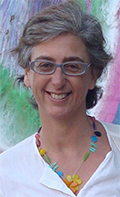 Simone de Lima
Simone de Lima
|
When
Peaceable Kingdom: The Journey Home screened at the
Environmental Film Festival in the Nation's Capital, a Brazilian woman in the audience, Simone de Lima, stepped forward during our Q&A to make a very important point. Following up on earlier questions that had been asked about the trend within the US meat industry, and even among some advocacy organizations, to promote higher priced "humane" animal products, Simone explained that even if certain extremely cruel practices are outlawed in the US, the industry quite commonly just moves these methods of production elsewhere, to countries like Brazil. The environmental devastation is exported along with the brutality to animals. She then offered a vivid description of driving for hours across whole regions of Brazil that were once Cerrado, the incredibly biodiverse Brazilian savannah-like biome that has been identified as one of the leading ecological hotspots in the world, second in biodiversity only to the Amazonian rainforest. The Cerrado was being clear cut in order to grow vast amount of feedstuffs for cows, who were then killed to satisfy the demand for cheap cow flesh in fast food restaurants all over the world, including the US. Simone's comments were powerful and clearly stunned many in the audience who had never given this aspect of the situation any thought.
Simone was the first of many incredible activists we would connect with from Brazil.
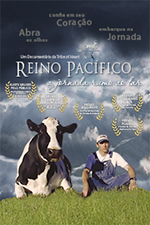 When it came time to prepare the Portuguese-language version of Peaceable Kingdom: The Journey Home for release on DVD and iTunes, Simone, as a professor of psychology, a vegan restauranteur, the founder of ProAnima (a non-profit animal advocacy organization), and a skilled translator, was the perfect candidate to audit the translation for accuracy and cultural appropriateness. She discovered that the original translator, who was a skilled subtitler but lacked knowledge about animal issues, had unintentionally shifted the film's message in some important ways. As just one example, the word "sacrifice" was used in many cases to describe the killing of animals for their flesh.
When it came time to prepare the Portuguese-language version of Peaceable Kingdom: The Journey Home for release on DVD and iTunes, Simone, as a professor of psychology, a vegan restauranteur, the founder of ProAnima (a non-profit animal advocacy organization), and a skilled translator, was the perfect candidate to audit the translation for accuracy and cultural appropriateness. She discovered that the original translator, who was a skilled subtitler but lacked knowledge about animal issues, had unintentionally shifted the film's message in some important ways. As just one example, the word "sacrifice" was used in many cases to describe the killing of animals for their flesh.
Simone made numerous improvements to the translation, ensuring that Brazilian audiences would be able to experience the film's message with total clarity. At the same time Simone was woking on the translation, she and a number of her family members were involved in an intense protest campaign to protect indigenous lands near the capital city of Brasilia from development that was being carried out in violation of an existing government commitment to protect the land. The struggle was difficult, but ultimately successful. For us, it underscored the power of conscience and peaceful protest to avert harm to the vulnerable.
Soon enough, Simone's work on the translation had the opportunity to be tested, when the Mostra Animal International Film Festival for the Animals hosted the Brazilian premiere of Peaceable Kingdom: The Journey Home. The screening surpassed everyone's already high expectations. The audience was so deeply affected by the film that they voted to award it the festival's "Oscow" -- one of three Best of Festival audience awards. The Brazilian Vegetarian Society volunteers who organized the event were so moved by the film's transformative impact that they committed to showing it again at the festival the following year, along with Tribe of Heart's first film, The Witness.
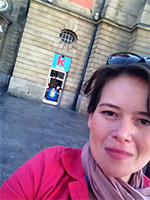 Bianca Dantas
Bianca Dantas
|
In the meantime, the Portuguese translation of The Witness had yet to be done. So Tribe of Heart core team member Trevor DeSane, who works closely with our translation volunteers worldwide, connected with Bianca Dantas of Cine VEDDAS, another Brazilian organization that focuses on using film for public outreach and education. Bianca had already begun holding screenings of Peaceable Kingdom: The Journey Home in several Brazilian cities. With record speed, she and her colleague Camila Hardt translated The Witness.
"The first time I watched The Witness, I said to myself, 'I have to show this film to Brazilian audiences, I have do that,'" said Bianca. "I think personal stories based on people's unique perspectives are interesting, because you don't have to tell people to do anything, you just share an experience. Documentary isn't a lecture, documentary is emotion. Peaceable and Witness are all about emotion. Translating The Witness was emotion all over, from the beginnig to the end."
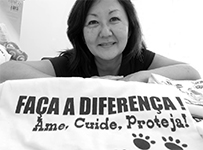 Rosana Tsibana
Rosana Tsibana
|
Trevor also reached out to Rosana Tsibana, whom he first met at the 2013 Anti-Fur Society Conference in Virginia. A long-time anti-fur activist, Rosana is the founder of a vegan products brand and also publishes a blog on animal rights issues.
Rosana's passion for the cause and her previous experience translating educational materials about the fur issue made her a natural candidate to tackle the many components of Tribe of Heart's Portuguese Screening Room website, which she translated with loving care, along with significant contributions from Bianca and Camila as well.
When the details were completed, Louise Tezza, a Brazilian Vegetarian Society volunteer, served as the language auditor for the film's Portuguese subtitles. The commitment and perseverance of these five highly motivated educator-activists ensured that everything would be in place in time for the Brazilian premiere of The Witness at the 2013 Mostra Animal International Film Festival for the Animals, where Peaceable Kingdom: The Journey Home would also be screened for the second year in a row.
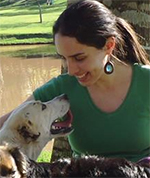 Louise Tezza
Louise Tezza
|
Louise, who was our primary liaison with the festival, was delighted by the audience's response. "As you can imagine, everybody loved Eddie!" she said. "They laughed out loud in many parts, like when he was telling why he accepted to cat sit the first kitten, what he thought a cat was, when Michele was saying that there were cats in the office and cat duties, and the 'papichulo' he uses to talk to his friends who work with him." Scenes that "led people to the front of their seats" included "that part about how he quit smoking, that pigs can't ask people not to kill them or the kids, how he made the connection that cat = chicken... and of course, when he tells how he was robbed and the connection he makes with animals that also scream and no one helps. Now that's a powerful message. For most people it is easier to feel empathy for another member of Homo sapiens than for other species. As soon as one feels that for Eddie, he transfers that feeling to animals in a brilliant way of explaining what's wrong with hurting animals."
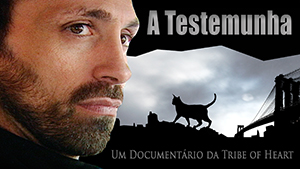 Immediately following the festival, we launched the Portuguese Screening Room, where The Witness and a suite of helpful tools and resources can now be accessed online for free in Portuguese. At the same time, Bianca began holding a series of screenings of The Witness in different Brazilian cities, including São Paulo, Fortaleza, Chapecó, and Ribeirão Preto. These events offer an exciting opportunity, because audience members who watch the film at a public screening are able to leave with the web address of the Portuguese-language version of the Screening Room, which allows them to immediately share what they have experienced and learned with their friends and families.
Immediately following the festival, we launched the Portuguese Screening Room, where The Witness and a suite of helpful tools and resources can now be accessed online for free in Portuguese. At the same time, Bianca began holding a series of screenings of The Witness in different Brazilian cities, including São Paulo, Fortaleza, Chapecó, and Ribeirão Preto. These events offer an exciting opportunity, because audience members who watch the film at a public screening are able to leave with the web address of the Portuguese-language version of the Screening Room, which allows them to immediately share what they have experienced and learned with their friends and families.
The screening coordinator in Ribeirão Preto was particularly impressed by the audience response: "I have never seen that before. It is very common people crying in animal rights film sessions, but in this case people were crying and laughing at the same time! And that is because Eddie is so charismatic! When we turned on the lights, everybody was in tears. The film brought many issues to the audience reflection, it was excellent! The chat took much longer than normal and many people brought questions about animal rights and veganism."
 Camila Hardt
Camila Hardt
|
For Camila, whose translation work helped make these screening events possible, it was rewarding to see the fruits of her labors. "The film is really inspiring," she said. "The immediate impact on those who watch it is obvious. It is able to satisfy numerous questions commonly asked about ethics towards animals. I heard many good reviews after the movie. Comments related to change, epiphany. From Eddie's example, we realize that we are all capable of change, that we all can really choose a more ethical way."
This translation and outreach work is touching lives and opening a dialogue during a time when many social issues are being intensively discussed and debated in Brazilian society. With a large proportion of younger citizens and a growing influence on the world stage, Brazil is a country with massive potential for change. The Brazilian activists, like many of the international activists we have been privileged to work with, tend to be dedicated and down-to-earth. At the same time, their efforts are guided by a deep awareness of the way so many justice issues are interconnected.
Poised for a Paradigm Shift
Interestingly, Brazil has a stronger foundation for animal protection than many countries. Article 225 of its 1988 Constitution explicitly states that it is the responsibility of government to "protect the flora and fauna, forbidding, by the power of law, practices that endanger their ecological function, cause the extinction of species, or subject animals to cruelty."
Based on this language, hunting is illegal in Brazil, and with rare exception, is upheld as a felony crime. "Because of this article," says Louise, "the judges in Brazil have rejected all judicial claims in which hunting clubs and others have tried to say that their liberties are limited by laws that forbid hunting. Unless they change the Constitution, hunting will never be accepted, since the court says every time it is cruel."
Brazil's Constitutional language makes it possible for judges and elected officials to work with activists and concerned citizens to enact some truly groundbreaking policies. For example, 10 of the 27 Brazilian states and hundreds of its cities now ban the use of animals in circuses. There are also some cities and states that have outlawed the rodeo. And in 2005, Brazil became the first country in the world to consider granting habeas corpus to a chimpanzee.
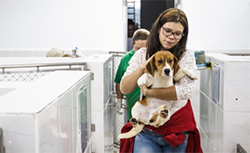 On Oct. 18, 2013, Brazilian animal activists liberated hundreds of dogs, rabbits,
On Oct. 18, 2013, Brazilian animal activists liberated hundreds of dogs, rabbits,
rats and mice from a lab in São Paulo.
|
At the same time, the use of animals for cosmetic testing is being reconsidered, and there is a strong chance that this year, Brazil will follow the lead of the European Union and Israel in the banning of the use of animals for the testing of cosmetics. "Brazil is the world's third largest cosmetic market," says Simone, "so the ban will mean a LOT of animals will be spared -- and new methods can trickle into other arenas."
While a ban on other forms of animal testing may still be a way off, some judicial rulings have blocked vivisection in specific situations, and even resulted in shutting down a major lab, where hundreds of animals were liberated from torturous experiments. Due to these and other high-profile cases, a wide segment of the population is now engaged in intense debate about animal justice issues.
Change is happening so fast in Brazil it is hard to keep up. John Curtin, an English filmmaker and animal advocate who visited Brazil to share his work at last year's Mostra Animal International Film Festival, was impressed by the receptiveness of the average Brazilian to street-level education by animal activists. He observed how people from all walks of life would stop and watch investigative video footage for long periods of time, and then stay even longer to share their thoughts and feelings, sometimes for up to half an hour. This is just one of many indications of how eager many Brazilians are to know the truth of what goes on behind closed doors. And when they see the truth, they are willing to get involved and also consider making different choices themselves.
While there is so much to celebrate about what is happening in Brazil, the work ahead is monumental. The Brazilian meat industry is, after all, one of the largest in the world, growing every year in the number of animals it kills for food and exports. As Simone pointed out at our Washington, DC screening, the industry's actions are devastating ever larger swaths of rainforest and Cerrado, relentlessly destroying the lives and homes of countless free-living animals as it enslaves and kills millions of other animals on ranches and farms. Over the long term, it is wiping out the habitats of entire species and contributing to the destabilization of our climate.
As time passes, more and more of us are realizing that our own efforts are part of a global movement that is devoted to sparing individuals from being harmed, preserving species threatened with extinction, and ultimately, saving our entire ecosystem from devastation. The love of justice and concern for those who are exploited creates a common bond that transcends cultural and generational boundaries.
The stakes could not be higher, and our work together could not be more needed. Each time we make connections with our fellow activists around the world, we are reminded that we are not alone, and that the benefits created by our work multiply many-fold when we combine our best efforts.
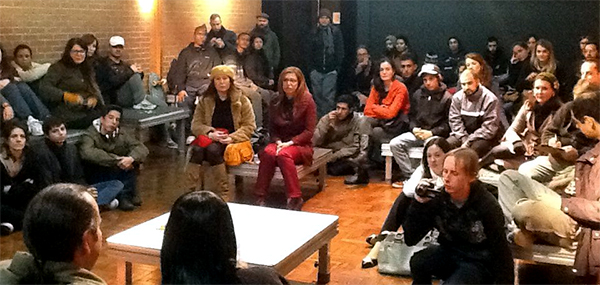
Cine VEDDAS, a project of the Brazilian animal advocacy group VEDDAS, is a non-profit film screening series focused on animal issues. During 2013, volunteers held monthly events in 11 Brazilian cities that were free and open to the public. Their line-up included four screenings of "Peaceable Kingdom: The Journey Home" and another four of "The Witness." The films are followed by lively community dialogue and vegan refreshments.
For more exciting news about developments toward justice for animals around the world, check out these Tribe of Heart news stories about Vietnam and Slovenia
Back to Index



